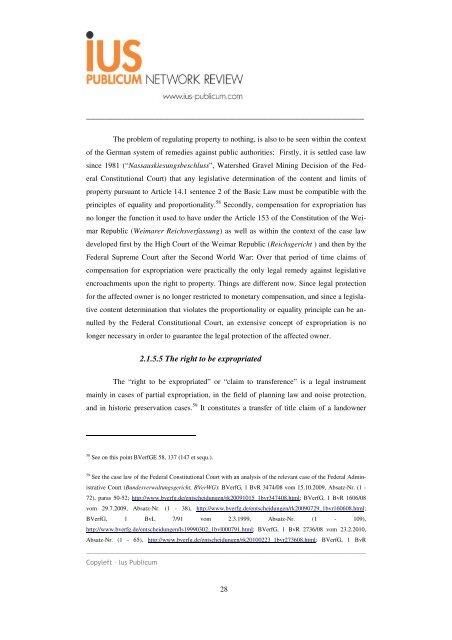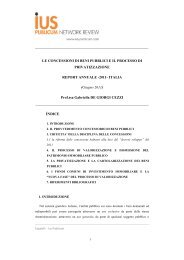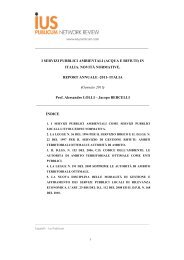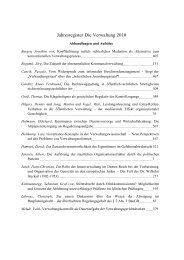Athanasios Gromitsaris, Expropriations, Takings - ius-publicum
Athanasios Gromitsaris, Expropriations, Takings - ius-publicum
Athanasios Gromitsaris, Expropriations, Takings - ius-publicum
Create successful ePaper yourself
Turn your PDF publications into a flip-book with our unique Google optimized e-Paper software.
_____________________________________________________________<br />
The problem of regulating property to nothing, is also to be seen within the context<br />
of the German system of remedies against public authorities: Firstly, it is settled case law<br />
since 1981 (“Nassauskiesungsbeschluss”, Watershed Gravel Mining Decision of the Fed-<br />
eral Constitutional Court) that any legislative determination of the content and limits of<br />
property pursuant to Article 14.1 sentence 2 of the Basic Law must be compatible with the<br />
principles of equality and proportionality. 58 Secondly, compensation for expropriation has<br />
no longer the function it used to have under the Article 153 of the Constitution of the Wei-<br />
mar Republic (Weimarer Reichsverfassung) as well as within the context of the case law<br />
developed first by the High Court of the Weimar Republic (Reichsgericht ) and then by the<br />
Federal Supreme Court after the Second World War: Over that period of time claims of<br />
compensation for expropriation were practically the only legal remedy against legislative<br />
encroachments upon the right to property. Things are different now. Since legal protection<br />
for the affected owner is no longer restricted to monetary compensation, and since a legisla-<br />
tive content determination that violates the proportionality or equality principle can be an-<br />
nulled by the Federal Constitutional Court, an extensive concept of expropriation is no<br />
longer necessary in order to guarantee the legal protection of the affected owner.<br />
______________________________________________________________________________<br />
Copyleft – Ius Publicum<br />
2.1.5.5 The right to be expropriated<br />
The “right to be expropriated” or “claim to transference” is a legal instrument<br />
mainly in cases of partial expropriation, in the field of planning law and noise protection,<br />
and in historic preservation cases. 59 It constitutes a transfer of title claim of a landowner<br />
58 See on this point BVerfGE 58, 137 (147 et sequ.).<br />
59 See the case law of the Federal Constitutional Court with an analysis of the relevant case of the Federal Admin-<br />
istrative Court (Bundesverwaltungsgericht, BVerWG): BVerfG, 1 BvR 3474/08 vom 15.10.2009, Absatz-Nr. (1 -<br />
72), paras 50-52; http://www.bverfg.de/entscheidungen/rk20091015_1bvr347408.html; BVerfG, 1 BvR 1606/08<br />
vom 29.7.2009, Absatz-Nr. (1 - 38), http://www.bverfg.de/entscheidungen/rk20090729_1bvr160608.html;<br />
BVerfG, 1 BvL 7/91 vom 2.3.1999, Absatz-Nr. (1 - 109),<br />
http://www.bverfg.de/entscheidungen/ls19990302_1bvl000791.html; BVerfG, 1 BvR 2736/08 vom 23.2.2010,<br />
Absatz-Nr. (1 - 65), http://www.bverfg.de/entscheidungen/rk20100223_1bvr273608.html; BVerfG, 1 BvR<br />
28





